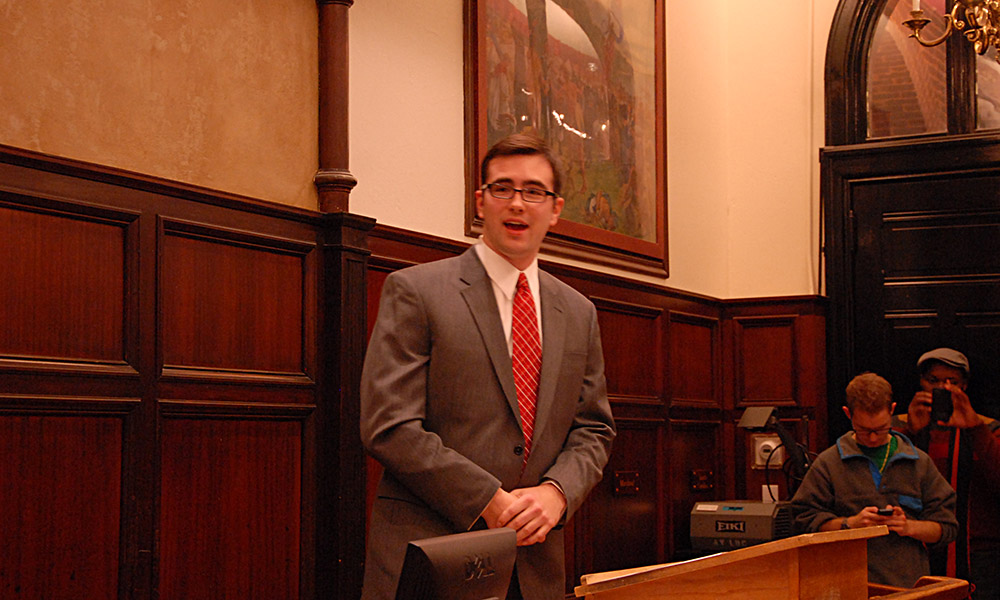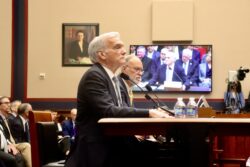The Voice sat down Georgetown University Student Association President Nate Tisa (SFS ‘14), and Vice President Adam Ramadan (SFS ‘14), both sworn in Saturday March 16.
Why did you decide to appoint some of your former opponents—Jack Appelbaum (COL ‘14), Spencer Walsh (MSB ‘14), and Shavonnia Corbin (SFS ‘14)—to your cabinet, creating a “team of rivals?”
Tisa: We wanted to make sure we were surrounded by the most passionate people who are the most qualified and the most able to make change. Most of the people in the field qualify in all those ways.
Ramadan: Rivals I think was an interesting word, because I think it was only fair in the course of those three or four weeks. Before we paint ourselves out to be rivals, ultimately we’re Georgetown students. They were all willing and choosing to do the things Nate and I hope to do.
Why did you expand the secretary of neighborhood relations to a secretary for D.C. relations?
Tisa: The first thing Clara [Gustafson (SFS ‘13)] and Vail [Kohnert-Yount (SFS ‘13)] told us when we were transitioning is how important neighborhood relations are going to be this year and for the next, five, 10, even 20 years. That’s really going to be the next big thing for GUSA and the University.
When we brought on [our staff], a lot had been involved in organizations that look at the city as a larger entity and they said there was a huge void GUSA hadn’t really been addressing. Things like the noise ordinance we could have seen coming from a mile away if we had been paying attention, but we weren’t.
How concerned are you about the apparent lack of plans for moving student groups out of New South, and what do you see as your role in this process?
Tisa: Because there is only a month and a half, extremely concerned. This is urgent. This needs to happen now. The good news is that finally the administration realizes that. A lot of the groups have been doing good advocacy on their own. We’re just getting in touch with them, finding out what they have done and giving them the push they need to get it done.
What are your objectives from now until May?
Ramadan: In the course of our first staff meeting we laid out a 40-day plan, which brings us right to the end of classes. There we went through our platform and determined short-term, medium-term, long-term, and then longest-term [objectives].
Tisa: Things we start on—free speech. We need to lay out what our goals are and then start that advocacy because if we don’t start that now, its going to take a while to get there. We have to start that now in order to see successes.
We think that given the campus plan we will see a short term win on alcohol policy, or party policy on campus. [We’re working on] getting some kind of, maybe mostly symbolic, but some acknowledgement from the University that in tandem with this increased off-campus enforcement, there needs to be some kind of tangible acknowledgement of that in policy. So what about on-campus party hosting is going to be easier? Will it have a later cut-off time? Will the noise restrictions be reduced? We have already had some discussions on those, and we’re confident that this semester we’ll get at least one big change there. You have to rock all the right boats now, so they expect you to rock them.
Another thing we are trying to do in the short term is look at the biased reporting system and get an updated interface for that. That is something we’re going to start conversations about immediately.
Nate, in The Hoya this Tuesday, you said you expect to face a lot of voices on campus that haven’t been heard before. What objections or challenges do you think will be raised and who will raise them?
Tisa: I meant a couple things by that. One thing that we want to continue is taking groups that GUSA hasn’t represented well in the past and making a substantial effort to do that. So facing those voices in a positive way. In some of the programs we want to move forward on, more accessible housing, getting a gender neutrality option and to make sure everyone has a living environment that affirms their dignity, there are some things that are a little more controversial than food trucks, or raising the keg ban.
Adam, in the same article, you said we are at a crossroads with our Jesuit identity and who we are as a school. Why did you say that and do you really believe we are in danger of drifting away from our traditions?
Ramadan: I think the true nature of being as old as we are, 224 years, we are different as a nation, as a university than when we were founded. While I think that advances are necessary, inevitable, and good, at the same time we are proud of our Jesuit heritage. Something that we [Nate and I] emphasize is the Jesuit identity as one of “yes” rather than one of “no.” Rather than fight the tide, move with it, but remembering where we come from.




